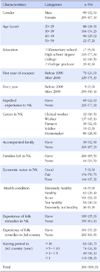Abstract
Purpose
The purpose of this study is to provide base data for preparing plans that North Korean (NK) Refugees can adjust themselves to our society with a healthy mind after they get over their health problems using the Health Belief Model, knowing the relationship between individual characteristics and health beliefs, and health behavior.
Methods
The subjects were 304 NK adult refugees in Hanawon. Data were collected by demographic questionnaire, health behavior scale, self-efficacy scale, perceived benefit scale, perceived barrier scale, perceived seriousness, perceived sensibility, and individual characteristics.
Figures and Tables
References
1. Barnes DM, Almasy N. Refugees' perceptions ofhealthy behaviors. J Immigr Health. 2005. 7:185–193.
3. Chai HS. Factors influencing drinking behaviors of college students using health belief model. 2001. Seoul: Yonsei University;Unpublished master's thesis.
4. Han IY. Depressive traits of North Korean defectors. Ment Health Soc Work. 2001. 11(6):78–94.
5. Hwang JY. Assessment of health and nutritional status of North Koreans by looking into North Korean defectors. 1999. Seoul: Ewha Womans University;Unpublished master's thesis.
6. Jung JH. A Study on the comparison of self-efficacy and health behavior on comprehensive health examination: Comparison of a volunteer group and a non-volunteer group. 2001. Suwon: Ajou University;Unpublished master's thesis.
7. Kim GR. A study on the relationship between health beliefs and sick role behavior of type B hepatitis patients. 1989. Daejeon: Chung Nam National University;Unpublished master's thesis.
8. Kim HL, Jeon JH, Che BS, Jeoung HS, Lee JY. Self-perceived health status, depression, stress, self-efficacy of Saeteomins in Hanawon. Chungnam J Nurs Acad. 2008. 11:1–12.
9. Kim JI. An effect of aquatic exercise program with self-help group activities and strategies for promoting self efficacy on pain, physiological parameters and quality of life in patients having rheumatoid arthritis. 1994. Seoul: Seoul National University;Unpublished doctoral dissertation.
10. Kim KC. The analysis of the subjective health status and the health utilization satisfaction among North Korean refugees in South Korea. 2004. Seoul: Yonsei University;Unpublished master's thesis.
11. Kim SY. A study on the health behavior of Korean elders. 1995. Seoul: Ewha Women's University;Unpublished doctoral dissertation.
12. Kim YK. A survey on the health status of Saeteomins in Gwangju and Jeonnam province. 2005. Gwangju: Chonnam National University;Unpublished master's thesis.
13. Lee KS. A study on the social adaptation process of women migrants-focusing on defecting North Korean residents in South Korea. J Asian Women. 2006. 45(1):191–234.
14. Lipson JG, Omidian PA. Health issues of Afghan refugees in California. West J Med. 1992. 157:271–275.
15. Maeng SJ. A study on the proved health belief and performance of healthy behaviors of some patient in Korean amy hospitals. 2006. Seoul: Kyung Hee University;Unpublished master's thesis.
16. Ministry of Unification. Demographic situation of North Korea refugee admitted and number in South Korea. 2011. 03. Retrieved August 29, 2011. from http://www.unikorea.go.kr.
17. Moon ES. A study on the relationship among knowledge of fracture prevention, health belief, and fracture prevention behaviors in patients with osteoporosis. 2008. Gwangju: Chonnam National University;Unpublished master's thesis.
18. Moon JS. A study of instrument development for health of Korean adults. 1990. Seoul: Yonsei University;Unpublished doctoral dissertation.
19. Nam MH. The relationship between health belief, self efficacy and exercise, diet compliance in coronary heart disease patients. 1997. Daegu: Keimyung University;Unpublished master's thesis.
20. Oh BJ. A structural model for health promotion and quality of life in people with cancer. 1994. Seoul: Seoul National University;Unpublished doctoral dissertation.
21. Padadopoulous I, Lees S, Lay M, Gebrehiwot A. Ehtiopian refugees in the UK: Migration, adaptation and settlement expreriences and their relevance to health. Ethn Health. 2004. 9:55–73.
22. Park SS. A study on the life stress, self-esteem and depression status of Saeteomins in Gwangju city and Jeonnam province. 2006. Gwangju: Chonnam National University;Unpublished master's thesis.
23. Rosenstock IM. The health belief model: Explaining health behavior thought expectations. 1990. San Francisco: Jossery-Bass.
24. Seo L, Lee MG, Lee YH, Che GS. Morbidity of north Korean refugees in China. Korean Unification Stud. 1999. 3(1):307–328.
25. Sherer M, Maddux JE. The self efficacy scale: Construction and validation. Psychol Rep. 1982. 51:663–671.
26. Song RY, Lee HJ. Effect of inpatient cardiac rehabilitation program on behavioral modification and quality of life in patients with coronary artery disease. J Korean Acad Nurs. 2000. 30(2):463–473.
27. Toar M, O'Brien KK, Fahey T. Comparison of self-reported health & healthcare utilization between asylum seekers and refugees: An observational study. BMC Public Health. 2009. 9:214.

28. Walker SN, Sechrist KR, Pender NJ. The health-promoting life style profile: Development and psychometric characteristics. Nurs Res. 1987. 36:76–81.
29. Yang SA. A study on the relationship between practice of breast self-examination and health belief model variables in middle aged women. 1996. Seoul: Ewha Womans University;Unpublished master's thesis.




 PDF
PDF ePub
ePub Citation
Citation Print
Print







 XML Download
XML Download